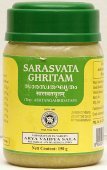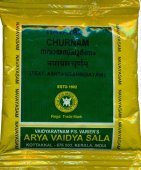Vyosha, Vyoṣa: 11 definitions
Introduction:
Vyosha means something in Hinduism, Sanskrit. If you want to know the exact meaning, history, etymology or English translation of this term then check out the descriptions on this page. Add your comment or reference to a book if you want to contribute to this summary article.
The Sanskrit term Vyoṣa can be transliterated into English as Vyosa or Vyosha, using the IAST transliteration scheme (?).
In Hinduism
Ayurveda (science of life)
Veterinary Medicine (The study and treatment of Animals)
Source: Asian Agri-History: Paśu Āyurvēda (Veterinary Medicine) in GaruḍapurāṇaVyoṣa (व्योष) refers to a type of powder, and is used in the various Anupāna (“drink take”), according to sections on the treatment of Horses (Gajāyurveda or Aśvāyurveda) in the Garuḍapurāṇa.—The Anupāna i.e. the drink take along with or after medicine was important in treatment. Because it may help in carrying, absorption, assimilation and enhancing action of the drugs. Normally the selection of anupāna is done depends upon disease, doṣa etc.—[...] In diseases of the deranged kapha sarṣapa-taila (mustard oil) with vyoṣa/trikaṭu powders are used as anupāna.
Toxicology (Study and Treatment of poison)
Source: Shodhganga: Kasyapa Samhita—Text on Visha ChikitsaVyoṣa (व्योष) is an ingredient of an herbal remedy to handle serpents (and snake-venom), as described in the Kāśyapa Saṃhitā: an ancient Sanskrit text from the Pāñcarātra tradition dealing with both Tantra and Viṣacikitsā—an important topic from Āyurveda which deals with the study of Toxicology (Viṣavidyā or Sarpavidyā).—Kāśyapa imparts various combinations of the Garuḍa Mantra, a wide range of different nyāsas and rituals to enslave serpents and use them for the bite-victim’s recovery caused by poison. He also mentions that a particular herbal combination [including Vyoṣa, ...] enable one to handle serpents with ease while the nails of cat, lizard, pigeon and sparrow assist in the extraction of the snake’s teeth.
Unclassified Ayurveda definitions
Source: Wisdom Library: Āyurveda and botanyVyoṣa (व्योष):—Another name for Trikaṭu, which refers to mixture of three pungent spices. It is used throughout Ayurvedic literature such as the Caraka-saṃhitā and the Suśruta-saṃhitā and is also mentioned in the Jvaracikitsā (‘treatment of fever’) chapter of the Mādhavacikitsā.

Āyurveda (आयुर्वेद, ayurveda) is a branch of Indian science dealing with medicine, herbalism, taxology, anatomy, surgery, alchemy and related topics. Traditional practice of Āyurveda in ancient India dates back to at least the first millenium BC. Literature is commonly written in Sanskrit using various poetic metres.
Languages of India and abroad
Sanskrit dictionary
Source: DDSA: The practical Sanskrit-English dictionaryVyoṣa (व्योष).—An aggregate of three spices (black and long pepper, and dry ginger.)
Derivable forms: vyoṣam (व्योषम्).
Source: Cologne Digital Sanskrit Dictionaries: Shabda-Sagara Sanskrit-English DictionaryVyoṣa (व्योष).—n.
(-ṣaṃ) The aggregate of three spices, or black-pepper, longpepper, and dry ginger. E. vi variously, uṣ to burn, aff. ac .
Source: Cologne Digital Sanskrit Dictionaries: Benfey Sanskrit-English DictionaryVyoṣa (व्योष).—i. e. vi-uṣ + a, n. The aggregate of three spices, black pepper, long pepper, and dry ginger.
Source: Cologne Digital Sanskrit Dictionaries: Cappeller Sanskrit-English DictionaryVyoṣa (व्योष).—[adjective] burning, hot.
Source: Cologne Digital Sanskrit Dictionaries: Monier-Williams Sanskrit-English Dictionary1) Vyoṣa (व्योष):—[from vyuṣ] a See sub voce
2) [=vy-oṣa] b mf(ā)n. ([from] vi +√uṣ; cf. √vyuṣ) burning, scorching, [Atharva-veda]
3) [v.s. ...] m. a species of elephant, [cf. Lexicographers, esp. such as amarasiṃha, halāyudha, hemacandra, etc.]
4) [v.s. ...] n. the three hot substances (viz. dry ginger, long pepper, and black pepper), [Suśruta]
Source: Cologne Digital Sanskrit Dictionaries: Yates Sanskrit-English DictionaryVyoṣa (व्योष):—(ṣaṃ) 1. n. The aggregate of three spices, black and long pepper and dry ginger.
[Sanskrit to German]
Sanskrit, also spelled संस्कृतम् (saṃskṛtam), is an ancient language of India commonly seen as the grandmother of the Indo-European language family (even English!). Closely allied with Prakrit and Pali, Sanskrit is more exhaustive in both grammar and terms and has the most extensive collection of literature in the world, greatly surpassing its sister-languages Greek and Latin.
Kannada-English dictionary
Source: Alar: Kannada-English corpusVyōṣa (ವ್ಯೋಷ):—
1) [noun] (collectively) the three pungent, medicinal substances ginger, long pepper and pepper.
2) [noun] a mixture of these substances.
Kannada is a Dravidian language (as opposed to the Indo-European language family) mainly spoken in the southwestern region of India.
See also (Relevant definitions)
Starts with: Vyoshacurna, Vyoshadi, Vyoshadilauha, Vyoshagnyadi, Vyoshailadi.
Full-text (+19): Trikatu, Vyoshacurna, Matsyavisha, Matsya, Kapharoga, Tailanvita, Loha, Curnita, Angaruha, Mustard oil, Bilala, Sarshapataila, Uccata, Nakulangaruha, Pindimula, Pindi, Naktamala, Nilimula, Gaulika, Ashvavisha.
Relevant text
Search found 8 books and stories containing Vyosha, Vy-oṣa, Vy-osa, Vy-osha, Vyoṣa, Vyosa, Vyōṣa; (plurals include: Vyoshas, oṣas, osas, oshas, Vyoṣas, Vyosas, Vyōṣas). You can also click to the full overview containing English textual excerpts. Below are direct links for the most relevant articles:
The Garuda Purana (by Manmatha Nath Dutt)
Chapter CXCVI - Therapeutic properties of drugs < [Dhanvantari Samhita]
Chapter CXCIV - Medical treatments of Sinus etc < [Dhanvantari Samhita]
Chapter CXCV - Medical treatment of female complaints < [Dhanvantari Samhita]
The Agni Purana (by N. Gangadharan)
Chapter 283 - The remedial herbs for all the diseases
Chapter 285 - The accomplished recipes that would revive the dead (mṛtasañjīvanī)
Chapter 279 - The description of the potent remedies (siddha-auṣadha)
Sushruta Samhita, Volume 6: Uttara-tantra (by Kaviraj Kunja Lal Bhishagratna)
Chapter LXI - Symptoms and Treatment of Epilepsy (Apasmara) < [Canto IV - Bhuta-vidya-tantra (psychology and psychiatry)]
Chapter XLIV - Symptoms and Treatment of Jaundice (Pandu-roga) < [Canto III - Kaya-chikitsa-tantra (internal medicine)]
Chapter LII - Symptoms and Treatment of Cough (Kasa) < [Canto III - Kaya-chikitsa-tantra (internal medicine)]
Women in the Atharva-veda Samhita (by Pranab Jyoti Kalita)
6a. Hymns to Secure the Love of a Woman < [Chapter 2 - The Strīkarmāṇi Hymns of the Atharvaveda]
The Skanda Purana (by G. V. Tagare)
Chapter 206 - Procedure for Performing Śrāddha < [Section 1 - Prabhāsa-kṣetra-māhātmya]
Sushruta Samhita, volume 1: Sutrasthana (by Kaviraj Kunja Lal Bhishagratna)
Related products
(+12 more products available)





